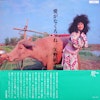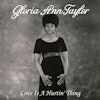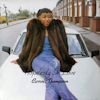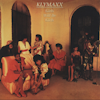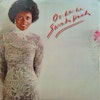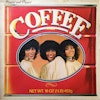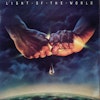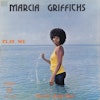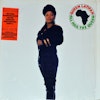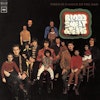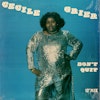There is a stark and distinct difference between embodying the desire to confront and dismantle the centuries-old systems of the patriarchy and taking tangible, active steps in destroying old and outdated structures cis male-dominated structures. The former only calls for thoughts and internal needs and the latter calls for physical, emotional, intellectual work and consistent and relentless movement toward reality-based change.
In jazz, three-time Grammy winner and highly accomplished bandleader and drummer Terri Lyne Carrington has committed to creating change via the fight against exclusionary treatment toward women and non-binary jazz and creative music artists. TLC’s spearheading of the Berklee Institute of Jazz and Gender Justice has been documented since its inception in 2019, but as time has gone on the job has required more and more from Carrington, who not only has been doing the inner work through investigating her own past and personal navigation within her career, but has gone further, teaming up with institutions like the New School, Mutual Mentorship for Musicians, and Winter Jazz Festival 2022 to call in diverse thinkers, jazz musicians, scholars, and educators to break through the walls of sexism and othering in jazz.
Her new collaborations manifested as a new collective called This Is a Movement, which convened for three days in mid-January 2022. The keynote talks consisted of panel discussions that focused on Community, the Bandstand, and Personal explorations for solutions. Carrington herself lent her voice and perspective to the Bandstand portion of the programming, which also included iconic musician Georgia Anne Muldrow, Lincoln Center’s Chief Artistic Officer Shanta Thake, and South African jazz vocalist Vuyo Sotashe.
While listening, sharing, and conversing with the other panelists, Terri Lyne shared portions of her experience and insight: “Georgia really nailed it in saying that it’s all about humanity. When you ask, ‘Where is this movement, where are we at?,’ I think we have to all really look at what we’re doing in service to humanity and to make our society and communities better. There are people on the grassroots level, there’s academic institutions building on something to make this work. There’s a groundswell that wasn’t there a few years ago. I wasn’t aware of a whole lot of talk on this subject until a few years ago, and that could be my own ignorance,” she says.
It is, though, not completely productive to focus on what she calls her past “ignorance,” as true, lifelong, and dedicated feminists and gender rights activists understand that this work is a process. Over time, knowledge and enlightenment emerges, and because Terri Lyne is new to this work, it is important to acknowledge that time will offer her countless opportunities to move deeper into viewing the world through a women-centered lens.
“I know there’s a lot of people kind of outside of the jazz community that had to make their own community which became under the umbrella of women in jazz,” she continues. “It was outside of the mainstream jazz community. It was a very feminist, a very white feminist point of view, but I think we’re really building on all of the work that’s been done with feminism and Black feminism over the years. And we’re seeing it all come together now to a bit of a head, which is great.”
There is a certain amount of bravery she needed to dive into a sphere of feminist knowledge that was virtually unknown to her. The fortuitous fact that she has been able to call on powerful Black feminists like Angela Davis and Gina Dent has given Terri Lyne an invaluable support system to help her create and understand what is needed to create new spaces for students and young musicians.
“When I started the Institute of Jazz and Gender at Berklee, I didn’t even know what to call it. I asked Angela Davis and Gina Dent, and they said Jazz and Gender Justice. I wasn’t even thinking that far. I was probably even nervous to use those terms, because I thought I’ve just been playing music my whole life, so when you talk about care as well, what moved me to start this institute was caring about the students and finally hearing them after ten years of teaching. I didn’t hear them until one day I did. And when I heard what they were saying, that’s what moved me to do this work. We’re building on these legacies where other people have done a lot of work.”
In creating these spaces for conversation and the pursuit for a better future for young jazz musicians of diverse backgrounds, Terri Lyne and those that surround and support her are acting as revolutionaries and activating reformations of paradigms that have the power to create new musical landscapes. With new landscapes, women, non-binary, queer, and trans artists of color will attain the freedom to create music that reveals their uniqueness in ways that have been unexplored in the past.
There is no telling what jazz will sound like a decade from now if Black feminist thought and other forms of radical activism and theory are properly implemented and put at the forefront of the jazz movement.
It is important to understand that engaging with Terri Lyne’s story, which gives a realistic view of how she and others have thought in the past, gives us an opportunity to learn from how things were done so that we do not repeat limited and male-centered behaviors. This movement is also in its infancy, so it may be unfair to ask the new generation of aware and forward-thinking musicians who cannot imagine seeing the world in ways that our predecessors saw it to put themselves in the position where they must work to fix the problems they aren’t responsible for.
It is though, through the grace, presence and emotional generosity of the jazz community's survivors, silenced, marginalized, young and gender non-conforming members that we have a tangible chance to create a new and inclusive paradigm. For that they deserve to be uplifted and treated with respect.
In mid-December 2021, Terri Lyne took the time to talk to Wax Poetics about the early stages of her career. It is possible that her upbringing and training may have insulated her from experiencing many of the traumatic experiences women, non-binary, and marginalized gender identities went through while attempting to succeed as jazz musicians. She was given an inside track, a mode of navigation by her father and founder of the Boston Jazz Society, saxophonist Sonny Carrington, on how to work with male jazz musicians, how to communicate and interact with them, causing her to become accepted by them early in her life and throughout the entirety of her lengthy and acclaimed career.

How did you come to believe you could play drums in your childhood? Did you know the instrument was mostly played by men?
It’s funny; I think back on that time period, and I just wasn’t noticing gender at all. Now, we have all these possibilities with gender, but [when I was a kid] I was a tomboy and enjoyed what the boys did. I never liked dolls and all of that. I was just being me, and because I was playing in the male-dominated environment playing an instrument that young women didn’t play because [young women] were socialized not to excel at it, I just never paid any attention. And I guess I was lucky that I didn’t have people in my life saying, “Girls don’t do that. Girls shouldn’t be aggressive. Girls shouldn’t play drums.” I feel I’m very fortunate in that way.
At some point, I was getting attention because I was a little girl, so I definitely got it in a sense that other people may have pointed that out, but in my personal identity, I didn’t pay any attention.
How did your parents support you in your musical career in your youth? What were the steps they took to get you to the point of playing live?
Music was in my family. My father played saxophone and drums, and my grandfather played drums. So, my dad was a bit disappointed that I was a girl, because he wanted to have a boy to carry on this musical tradition. But of course, he grew to love me anyway. As far as an aptitude for music, he just went full steam ahead, which I commend him for, because I’m not sure that everybody would have done that.
I think when people have daughters, they start to see things like [discrimination]. You shouldn’t have to have a daughter to see that things are unjust, but that’s what tends to happen. And what really blows my mind is that some people have daughters and they still act as if they don’t. Some people that don’t treat young women fairly, a lot of them have daughters, but probably not daughters that are interested in [drums]. But once you have a daughter that’s interested in a male space, that’s when they begin to open up.
Did you have any experiences with instructors and men in jazz that may have lent to a bit of understanding that masculinity or toughness was a big factor in jazz drumming?
Not really. My dad tried to pick good instructors that didn’t treat me differently as a girl, but I have a story that kind of looks at the ego [involved]. I had one teacher who was a fine teacher, who really got me together, and then I think he got frustrated as a teacher and wanted to be on the road playing more. He was always really supportive, but I think he started to snap. One day, I had sat in on one of his gigs, and he said, “You’re not supposed to be playing my shit! That’s my shit!” He threw a book at me, and it kind of hurt my feelings, because he was one of my favorite people. That was my last lesson. [Soon after] he quit teaching and went on the road, so I don’t think that was about me. He was just at a place in his career where he didn’t want to make other people feel great, and not having his shot.
And when I was ten, I stood up to Buddy Rich, who is notorious for being in bad moods and going off on his band. I was introduced to him at a festival, and he said, “Well, you better not be any good,” and I said, “Oh, yeah? Who’s going to stop me?” And I almost said, “Certainly not you!” Then he said, “You want to come to play with my band?”—just because I stood up to him.
When did you personally realize that men in jazz felt that women couldn’t play drums? What made you continue on despite this realization?
I’ve never said I had that realization. I don’t buy into that necessarily, because I don’t generalize. That’s part of what has gotten me to where I am, because there were always men that believed in me as well as some that maybe didn’t. But I didn’t get exposed to the ones that didn’t. I see this in other people’s lives. I see this in young women that have no support.
There are communities in jazz. There’s a Black community and sub-communities, then there’s a wider jazz community. When I think of a lot of the bad apples in jazz education and high schools, the stories I’ve heard, a lot of those stories come from white students and are pointing to white teachers, which I find interesting. The jazz spaces that I’ve occupied are primarily Black, but there’s definitely a lot of misogyny in the Black space as well. I’m not saying there’s more in the white space, but I feel in the Black space, the young Black women maybe don’t complain about it as much. They don’t feel victimized as much—I’m not saying they’re not [victimized]—but I feel we’re used to being less privileged and having to struggle, so it’s something that ends up feeling more like a part of our daily lives.
Do you think the Black women players in jazz who experience success may perpetuate misogyny because it was normalized and therefore not challenged?
When I grew up, there were only a couple of iconic women [in jazz]. The biggest one was Mary Lou Williams. I met her and was aware of her, and it’s kind of well known that she didn’t necessarily want to be involved with all-female bands and wasn’t incredibly supportive of women players because [she felt that] most women weren’t on her level. Male musicians were learning from her, so she didn’t want to be put in that box of women players.
So, you have the women that are successful often, including myself back in the day, really shy away from playing with other women because we, in essence, don’t want it to bring us down. If we’re being accepted in the dominant culture as someone who was “let through,” you want to stay in that space and stay regarded.
The [women] that succeeded didn’t really do the work like Geri Allen [did]. I met her when I was thirteen. She was one of the first women that I saw [doing that work]. Later in life, she started a girl’s camp, so we’ve moved into the work, but we were indoctrinated where we were exceptions and we didn’t want to give that up. Everyone wasn’t like that, but their understanding far succeeded us.
There’s the thing of Black women protecting Black men, which goes back historically and there are real reasons why that’s something that happens. If I see somebody calling somebody a predator, I ask them, “Have you had personal experience? What makes you think that?” Because there’s this terrible history that we can’t ignore when it comes to race. It’s something that we need to look at from more than one point of view.

You’ve come so far from where you used to be in regard to gender relations and gender justice, and thank you for being honest about the dynamics of successful women musicians in the past. It’s known that Angela Davis has been a big supporter of your growth. But I don’t think the origin story of how you and Angela Davis met has been widely shared. How did you maintain a friendship with her even before you came to do the work you’re doing?
I think more radical feminist thought was always in me, as Angela says, “It was always there,” so it was more of an evolution than a full transformation.
I met Angela when I was doing The Arsenio Hall Show. This was way before emails, in 1989, and she came on the show and knew who I was, because I was on a couple of successful jazz albums and she’s an avid jazz fan. She was teaching some courses at San Francisco State University, and I attended one of her classes with the songwriter Siedah Garrett. I said to her, “Let’s keep in touch,” and she walked away. I realized I had no way to contact her, but [after some time] I went to San Francisco to play a gig with Stan Getz, and I ran into her at a restaurant. It was fate, and she invited me to her house for breakfast the next day. So that’s how our friendship began.
When it comes to maintaining [the friendship], there were some things that were questionable. She would say, “Oh, you can’t say that!” And I’d say, “Well, this is my experience!” We had some healthy debates, and I respected and admired her thought process.
It was all seeping in, but I would always say, “This is what I know, this is what I see, this is my experience,” and not really looking at the bigger picture. So, what it really took was for me to start looking at the bigger picture and other people’s experiences, as opposed to looking at how I dealt with things. I think that’s my personality, something I was born with. I’m a natural fighter. I’m not letting any man stop me from what I want to attain. I would always think if you want something, just toughen up—just do it!
But I realized one day that everyone doesn’t have that same personality, nor should they. How boring would the world be if women were all the same?
I would get frustrated if I had a female student that would start to cry. I would be tough on them, because in my brain, I thought the real world wouldn’t accept that. But I had to understand that there are a lot of reasons as to why people react that way, and there are men in the world who aren’t able to express that part of themselves because of the way they’ve been socialized. And there are men now who are thankfully rejecting hyper-masculinity. That’s why the young men that are in our institute are not trying to engage in it.
When you started the Institute and spoke at colleges and panels, how were people reacting to your thoughts and work?
It’s amazing how many phone calls, emails, and texts I got from people saying, “Wow, this is something I’ve never thought about.” And I’m like, we have really failed, because we didn’t think about it—why our record collections are male-dominated. Why women are mainly singing or playing the piano, how instruments are gendered, and who we’re reading about in magazines. Before these last few years, it was easy [to ignore it].
After taking this all in, it made me feel like everything I see and am inundated with really tells me that I shouldn’t be here. It makes me think how young women feel and how many have quit who had talent. How many quit because it just wasn’t fun?
I don’t think things change unless you pull the problem up from the root and keep drilling at the meat of the problem. And when you drill down far enough, patriarchy seems to be the root cause of the issue.
